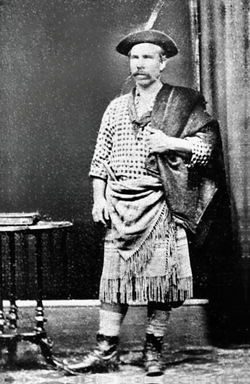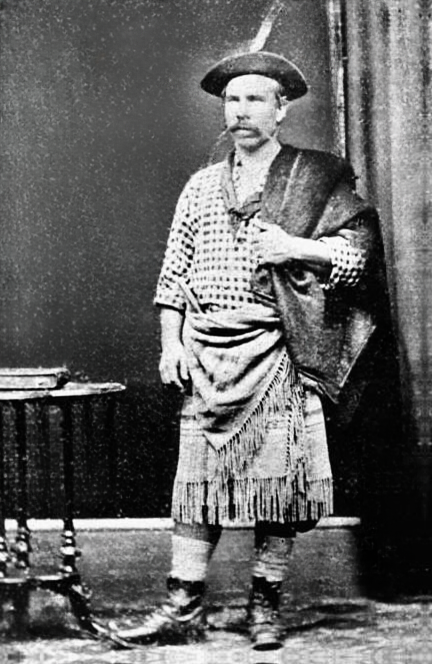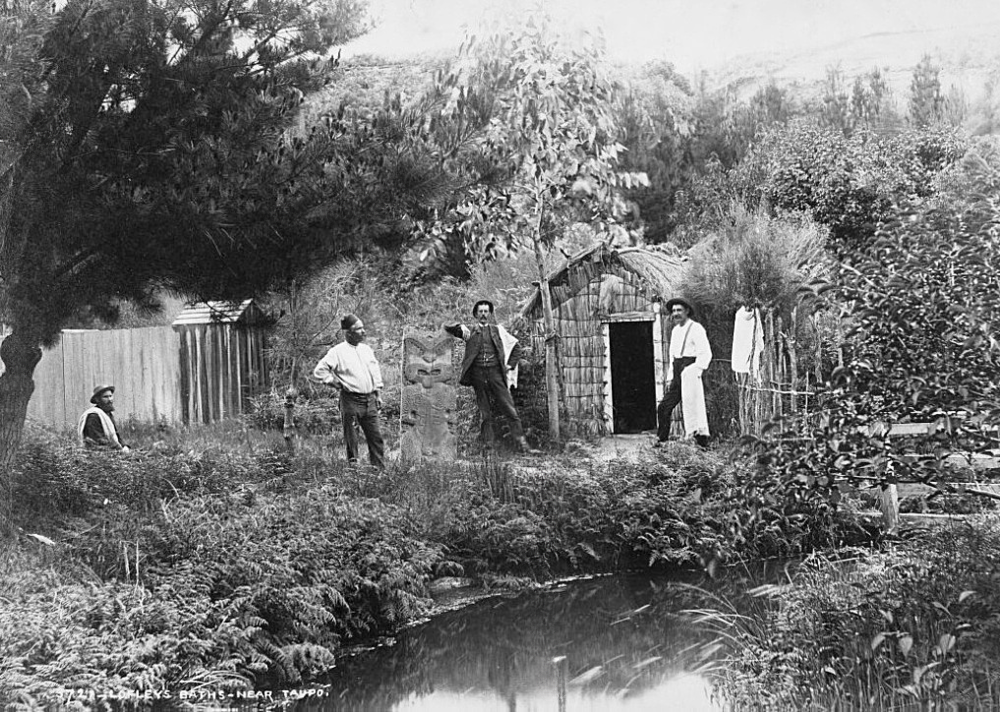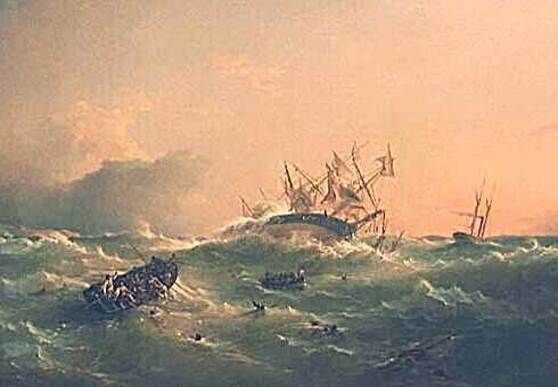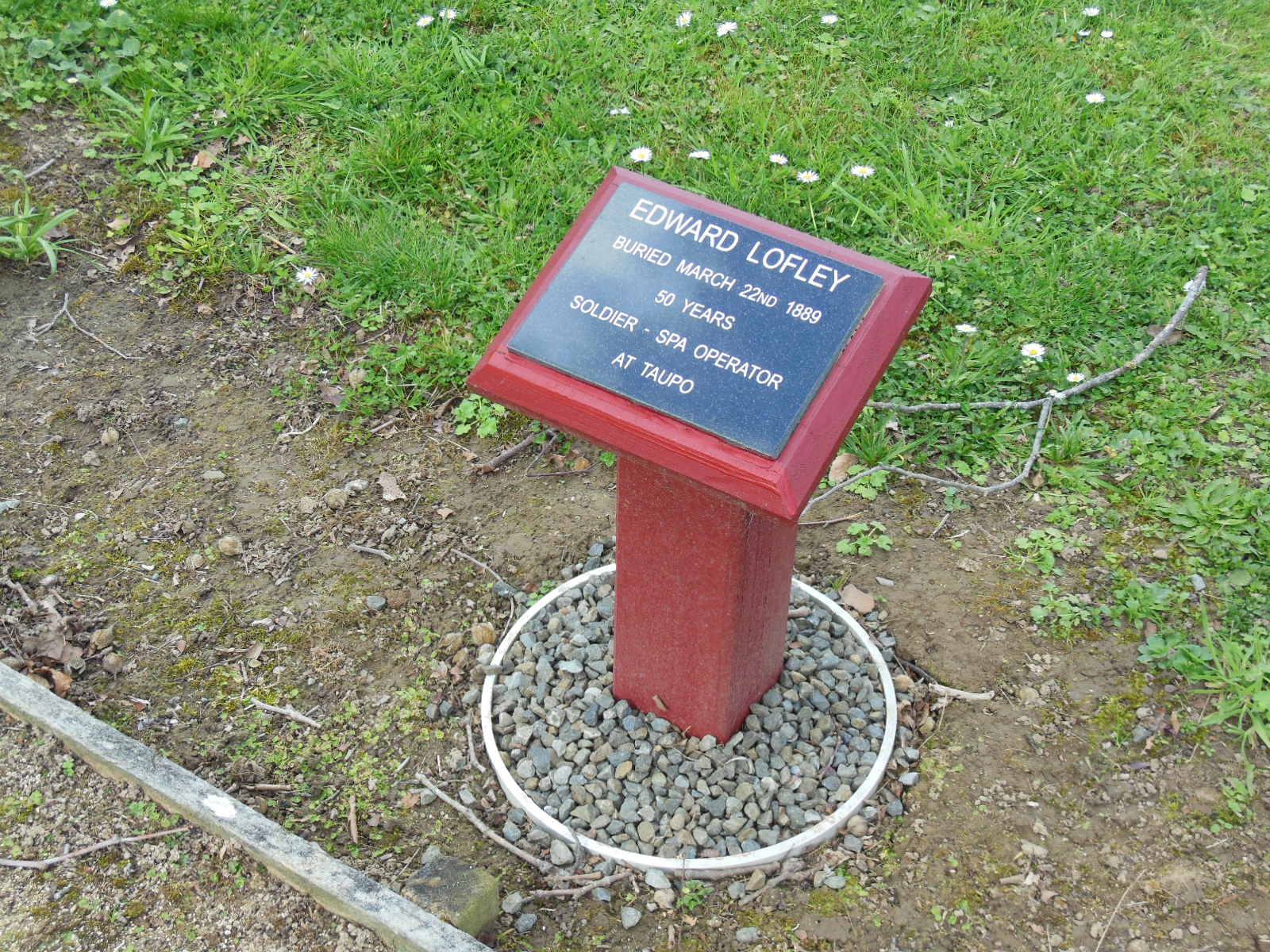He was an ex-Navy man, a survivor from the crew of HMS Orpheus wrecked on the Manukau bar, off the west coast of Auckland, in 1863.
He fought in the Waikato war as a member of the Naval Brigade. The Naval Brigade lost 13 (including virtually all of its officers) and 26 were wounded during the Battle of Gate Pa
He later joined the New Zealand Armed Constabulary
From 1879 to 1886 he was the Taupo correspondent for the Hawke's Bay Weekly Courier. He also performed a similar function for several other North Island newspapers
Being a very outspoken person, Edward was often in trouble (mostly with the constabulary)
* he had his bath-houses burned down (twice in the same year) - he rebuilt
* he was very badly injured when set upon by 4 men in 1884
From the late 1860s he was the proprietor of 'The Glen', the Hot Baths & Sanatorium at Tapuaeharuru (place of echoing footsteps), Taupo
* he was the "well known & jovial" guide for the Rotomahana Terraces better known as the Pink & White Terraces (destroyed in the 1886 volcanic eruption of Mount Tarawera) via Orakeikoraka, Alum Cave and Paeroa boiling Mud Cauldrons for over 20 years
* He was also responsible for sending samples of hot springs water to the Government Laboratory in Wellington for analysis
In 1876 he had a Maori wife but she may have been common-law as on 4th May 1880 he married Rosanna Boyle (1852-1917) at Tauranga & had at least 4 children
those known to date
7 April 1881 - Charles Edward Lofley
17 Sept 1882 - Mary Lofley
. Mary was adopted in 1886 by Joanne and David Gray of Napier
21 April 1884 - 1962 Louis George Lofley
* there was another (unknown) son
By 1885 he and his wife Roseanna (Rosine) had separated. He was eventually found and remanded in Auckland. He was charged with having deserted her in Auckland. He countered she left of her own free will
By 1886 he had left Taupo and his spa - it was taken over by John Joshua. He became the proprietor of a temperance hotel at Napier and later kept a boarding house there.
In Jan 1889 his wife was living in Woodville where she was a housekeeper for Mr & Mrs Snadden, a railway employee. She was sentenced to 3 months imprisonment for throwing tin at 10 year old John Snadden, cutting his hand
On 19 Oct 1890 a son, Arthur James, was born to Roseanna, father not recorded (he was registered as 'Lofley' but was born 19 months after Jack's death) - Arthur died in 1986 aged 95
At the time of his death Edward's 3 known children would have been aged 8, 7 and 5.
NOTE these children, being left alone when their father died, (at that time their mother was in prison) were either adopted or fostered out and may have changed their names as any further info is hard to find
Edward died aged about 49-51 after a brief illness at the Star Hotel, Woodville
the following bio was taken from Dictionary of NZ Biography, written in 1993 by Barbara Cooper and Brian O'Brien .. Edward Lofley, also known as John or Jack Loffley, was born in England, probably sometime between 1838 and 1840. His parents' names and the details of his early life are unknown. He is said to have arrived in New Zealand as a member of the crew of the British naval vessel Orpheus, which was wrecked on the Manukau Harbour bar in February 1863. Lofley fought in the Waikato war as a member of the Naval Brigade. He later joined the New Zealand Armed Constabulary, and by the late 1860s had settled at Tapuaeharuru (Taupo). By 1873 he was the proprietor of The Glen, a spa and bath-house at Tapapakuao, just north of Tapuaeharuru. Several visitors left written accounts of the spa and its seemingly eccentric proprietor. Former premier William Fox visited the area in 1874. He told how Lofley had attempted to plant 'six or eight acres of…swampy land' and had tried to develop the resources of the two springs 'over which he presides as a sort of river god.' As Lofley occupied the site without legal title, Fox recommended granting him a lease on condition that he erect a number of cottages and baths within a given time. The lease was granted, and by 1875 Lofley was providing accommodation and food: meals included salads of vegetables grown by Lofley himself. A German traveller, Max Buchner, who passed through the area in 1876, described one of the natural baths of spring water with its roof of plaited reeds from which honeysuckle hung. A rush hut was used as the changing shed and 1s. was charged for baths.
Lofley was well known as a guide in the thermal districts. His picturesque costume of bush-shirt and kilt – the informal uniform of the Armed Constabulary – topped with a 'high broad-brimmed hat with a pheasant's feather sticking out of it' complemented his short, stocky figure and 'whiskery, honest, good-natured face'. Lofley was a favourite with tourists because of his 'originality of manner' and his store of amusing anecdotes.
From 1879 to 1886 Lofley was the Taupo correspondent for the Hawke's Bay Weekly Courier; he performed a similar function for several other North Island newspapers. His reports provide a record of the township's early life: complaints about roading and accounts of the activities of the Taupo Amateur Dramatic Club, Native Land Court hearings, and balls arranged by the Armed Constabulary. His descriptions of criminal proceedings were particularly colourful. On one occasion he reported that a local publican had been fined for allowing illegal gambling in which a policeman was implicated, and on another he noted that a police sergeant had been charged with embezzlement. In his writing Lofley used Latin tags, odd bits of several European languages and quotations from Dickens, Shakespeare, and Gilbert and Sullivan.
Sometimes Lofley's comments landed him in trouble. In May 1882, observing that the bishop of Waiapu, Edward Craig Stuart, had recently held a service in Taupo, he commented that it 'was much needed, as clerical visits are like angels' visits in this place.' The implication that Taupo needed a clerical visit apparently caused offence among the local inhabitants: a month later Lofley wrote 'I now retract my words and say that such visits are not needed and never were, and let us hope never will be.'
Lofley's outspokenness was at the root of what became a feud with members of the Armed Constabulary. In 1882 two of Lofley's bath-houses were destroyed by fire. He offered a reward for the capture of the culprits and criticised the subsequent official investigation. Several weeks later he reported that he had surprised two members of the force breaking pieces of silica from the Crow's Nest geyser. He instituted a private prosecution, unsuccessfully. In October 1883 he was struck off the list of members of the Armed Constabulary's reading room, an action which he attributed to his criticism of the force's members in the press. In late August 1884 Lofley was lured out of a hotel at Tarawera and set upon by four men; he claimed to have recognised one as Sergeant Cleary of the Armed Constabulary. He was unable to prove his claim in court, but Cleary earned a severe reprimand from the magistrate. Lofley's apparent hostility to the Armed Constabulary may have originated in 1880 when, as a result of his increasing the price of beer at The Glen, members of the force refused to drink there.
Little is known of Lofley's private life. When Max Buchner visited The Glen in 1876, he met Lofley's Maori wife. Later, on 4 May 1880, at Tauranga, Lofley married Rosanna Boyle; they had at least four children: three sons and a daughter. Lofley seems to have left Taupo in 1886. It is not clear what prompted his departure, although it appears that he had become unpopular with more than one section of the community. During the year he had complained about the management of a Taupo hotel; his conduct on this occasion 'actually gave rise to suspicions of his sanity or sobriety, or both.' His spa was taken over by John Joshua. In May that year the Lofleys' daughter, Mary, was adopted by Joanne and David Gray of Napier; the reasons behind this are unknown.
Lofley became the proprietor of a temperance hotel at Napier and later kept a boarding house there. He fell out with his wife and she left him to become a housekeeper at Waipukurau and later at Woodville. Lofley apparently decided to shift to Woodville and went there in March 1889 to buy land. He died after a brief illness on 22 March at the Star Hotel, Woodville. It is not known where or when his wife died.
He was an ex-Navy man, a survivor from the crew of HMS Orpheus wrecked on the Manukau bar, off the west coast of Auckland, in 1863.
He fought in the Waikato war as a member of the Naval Brigade. The Naval Brigade lost 13 (including virtually all of its officers) and 26 were wounded during the Battle of Gate Pa
He later joined the New Zealand Armed Constabulary
From 1879 to 1886 he was the Taupo correspondent for the Hawke's Bay Weekly Courier. He also performed a similar function for several other North Island newspapers
Being a very outspoken person, Edward was often in trouble (mostly with the constabulary)
* he had his bath-houses burned down (twice in the same year) - he rebuilt
* he was very badly injured when set upon by 4 men in 1884
From the late 1860s he was the proprietor of 'The Glen', the Hot Baths & Sanatorium at Tapuaeharuru (place of echoing footsteps), Taupo
* he was the "well known & jovial" guide for the Rotomahana Terraces better known as the Pink & White Terraces (destroyed in the 1886 volcanic eruption of Mount Tarawera) via Orakeikoraka, Alum Cave and Paeroa boiling Mud Cauldrons for over 20 years
* He was also responsible for sending samples of hot springs water to the Government Laboratory in Wellington for analysis
In 1876 he had a Maori wife but she may have been common-law as on 4th May 1880 he married Rosanna Boyle (1852-1917) at Tauranga & had at least 4 children
those known to date
7 April 1881 - Charles Edward Lofley
17 Sept 1882 - Mary Lofley
. Mary was adopted in 1886 by Joanne and David Gray of Napier
21 April 1884 - 1962 Louis George Lofley
* there was another (unknown) son
By 1885 he and his wife Roseanna (Rosine) had separated. He was eventually found and remanded in Auckland. He was charged with having deserted her in Auckland. He countered she left of her own free will
By 1886 he had left Taupo and his spa - it was taken over by John Joshua. He became the proprietor of a temperance hotel at Napier and later kept a boarding house there.
In Jan 1889 his wife was living in Woodville where she was a housekeeper for Mr & Mrs Snadden, a railway employee. She was sentenced to 3 months imprisonment for throwing tin at 10 year old John Snadden, cutting his hand
On 19 Oct 1890 a son, Arthur James, was born to Roseanna, father not recorded (he was registered as 'Lofley' but was born 19 months after Jack's death) - Arthur died in 1986 aged 95
At the time of his death Edward's 3 known children would have been aged 8, 7 and 5.
NOTE these children, being left alone when their father died, (at that time their mother was in prison) were either adopted or fostered out and may have changed their names as any further info is hard to find
Edward died aged about 49-51 after a brief illness at the Star Hotel, Woodville
the following bio was taken from Dictionary of NZ Biography, written in 1993 by Barbara Cooper and Brian O'Brien .. Edward Lofley, also known as John or Jack Loffley, was born in England, probably sometime between 1838 and 1840. His parents' names and the details of his early life are unknown. He is said to have arrived in New Zealand as a member of the crew of the British naval vessel Orpheus, which was wrecked on the Manukau Harbour bar in February 1863. Lofley fought in the Waikato war as a member of the Naval Brigade. He later joined the New Zealand Armed Constabulary, and by the late 1860s had settled at Tapuaeharuru (Taupo). By 1873 he was the proprietor of The Glen, a spa and bath-house at Tapapakuao, just north of Tapuaeharuru. Several visitors left written accounts of the spa and its seemingly eccentric proprietor. Former premier William Fox visited the area in 1874. He told how Lofley had attempted to plant 'six or eight acres of…swampy land' and had tried to develop the resources of the two springs 'over which he presides as a sort of river god.' As Lofley occupied the site without legal title, Fox recommended granting him a lease on condition that he erect a number of cottages and baths within a given time. The lease was granted, and by 1875 Lofley was providing accommodation and food: meals included salads of vegetables grown by Lofley himself. A German traveller, Max Buchner, who passed through the area in 1876, described one of the natural baths of spring water with its roof of plaited reeds from which honeysuckle hung. A rush hut was used as the changing shed and 1s. was charged for baths.
Lofley was well known as a guide in the thermal districts. His picturesque costume of bush-shirt and kilt – the informal uniform of the Armed Constabulary – topped with a 'high broad-brimmed hat with a pheasant's feather sticking out of it' complemented his short, stocky figure and 'whiskery, honest, good-natured face'. Lofley was a favourite with tourists because of his 'originality of manner' and his store of amusing anecdotes.
From 1879 to 1886 Lofley was the Taupo correspondent for the Hawke's Bay Weekly Courier; he performed a similar function for several other North Island newspapers. His reports provide a record of the township's early life: complaints about roading and accounts of the activities of the Taupo Amateur Dramatic Club, Native Land Court hearings, and balls arranged by the Armed Constabulary. His descriptions of criminal proceedings were particularly colourful. On one occasion he reported that a local publican had been fined for allowing illegal gambling in which a policeman was implicated, and on another he noted that a police sergeant had been charged with embezzlement. In his writing Lofley used Latin tags, odd bits of several European languages and quotations from Dickens, Shakespeare, and Gilbert and Sullivan.
Sometimes Lofley's comments landed him in trouble. In May 1882, observing that the bishop of Waiapu, Edward Craig Stuart, had recently held a service in Taupo, he commented that it 'was much needed, as clerical visits are like angels' visits in this place.' The implication that Taupo needed a clerical visit apparently caused offence among the local inhabitants: a month later Lofley wrote 'I now retract my words and say that such visits are not needed and never were, and let us hope never will be.'
Lofley's outspokenness was at the root of what became a feud with members of the Armed Constabulary. In 1882 two of Lofley's bath-houses were destroyed by fire. He offered a reward for the capture of the culprits and criticised the subsequent official investigation. Several weeks later he reported that he had surprised two members of the force breaking pieces of silica from the Crow's Nest geyser. He instituted a private prosecution, unsuccessfully. In October 1883 he was struck off the list of members of the Armed Constabulary's reading room, an action which he attributed to his criticism of the force's members in the press. In late August 1884 Lofley was lured out of a hotel at Tarawera and set upon by four men; he claimed to have recognised one as Sergeant Cleary of the Armed Constabulary. He was unable to prove his claim in court, but Cleary earned a severe reprimand from the magistrate. Lofley's apparent hostility to the Armed Constabulary may have originated in 1880 when, as a result of his increasing the price of beer at The Glen, members of the force refused to drink there.
Little is known of Lofley's private life. When Max Buchner visited The Glen in 1876, he met Lofley's Maori wife. Later, on 4 May 1880, at Tauranga, Lofley married Rosanna Boyle; they had at least four children: three sons and a daughter. Lofley seems to have left Taupo in 1886. It is not clear what prompted his departure, although it appears that he had become unpopular with more than one section of the community. During the year he had complained about the management of a Taupo hotel; his conduct on this occasion 'actually gave rise to suspicions of his sanity or sobriety, or both.' His spa was taken over by John Joshua. In May that year the Lofleys' daughter, Mary, was adopted by Joanne and David Gray of Napier; the reasons behind this are unknown.
Lofley became the proprietor of a temperance hotel at Napier and later kept a boarding house there. He fell out with his wife and she left him to become a housekeeper at Waipukurau and later at Woodville. Lofley apparently decided to shift to Woodville and went there in March 1889 to buy land. He died after a brief illness on 22 March at the Star Hotel, Woodville. It is not known where or when his wife died.
Inscription
EDWARD LOFLEY
Buried March 22nd 1889
50 Years
Soldier - Spa Operator At Taupo
Gravesite Details
his details were provided by Robert Eldon Grinlinton on 21-3-1889, who recorded him as "about 40 years old"
Funeral Director: R E Grinlinton
Interment ID: 4564
Family Members
Advertisement
Explore more
Sponsored by Ancestry
Advertisement
